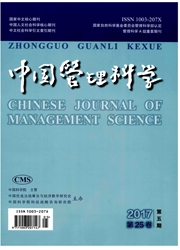

 中文摘要:
中文摘要:
针对单制造商和单零售商组成的供应链,考虑供应链碳减排技术投资与否两种情形,构建了集中式决策、分散式决策和供应链成员协同决策的博弈模型,探讨了消费者碳足迹敏感系数、碳限额及碳减排成本系数对供应链成员最优决策及减排效果的影响。研究表明,碳交易价格与碳限额呈线性关系时,供应链及制造商的利润与碳限额并不是线性递增的关系,政府合理的制定碳限额能够促使供应链企业有效减少碳排放;当消费者支付意愿依赖于产品碳足迹时,企业可以通过投资碳减排技术在减少碳排放量的同时获取更大的利润,实现环境与经济的协调发展。制造商和零售商通过渠道协作共同决策碳减排水平时,供应链碳排放总量比分散决策情形下明显减少。
 英文摘要:
英文摘要:
Considering two conditions of whether carbon reduction technology is invested or not, two-stage dynamic game model is discussed in a supply chain consisting of a single manufacturer and a retailer under the Carbon Cap-and-Trade Rules. The influence of consumer's sensitivity coefficients on carbon footprint, carbon emission cap and carbon abatement cost coefficient on enterprises' decisions and carbon reduction is studied under the condition of integrated manners, decentralized manners and cooperative policy. The re-sults show that when the carbon trading price depends linearly on the carbon cap, manufacture and supply chain's profits are not linear with the carbon cap, and the government can make enterprises reduce carbon emissions by formulate a reasonable carbon cap. When consumer's willingness to pay for low carbon prod- uct depends on “carbon footprint”, the enterprise can reduce the carbon emission as well as obtain greater profits, through investing carbon emission reduction technology, and then realize coordinated development between environment and economy. Carbon emissions can be reduced significantly when manufacturer and retailer make joint decisions on carbon reduction levels through channel coordination.
 同期刊论文项目
同期刊论文项目
 同项目期刊论文
同项目期刊论文
 Production decisions in a hybrid manufacturing-remanufacturing system with carbon cap and trade mech
Production decisions in a hybrid manufacturing-remanufacturing system with carbon cap and trade mech Misplaced Inventory and Lead-Time in the Supply Chain: Analysis of Decision-Making on RFID Investmen
Misplaced Inventory and Lead-Time in the Supply Chain: Analysis of Decision-Making on RFID Investmen Using LMDI method to analyze the influencing factors of carbon emissions in China’s petrochemical in
Using LMDI method to analyze the influencing factors of carbon emissions in China’s petrochemical in 期刊信息
期刊信息
